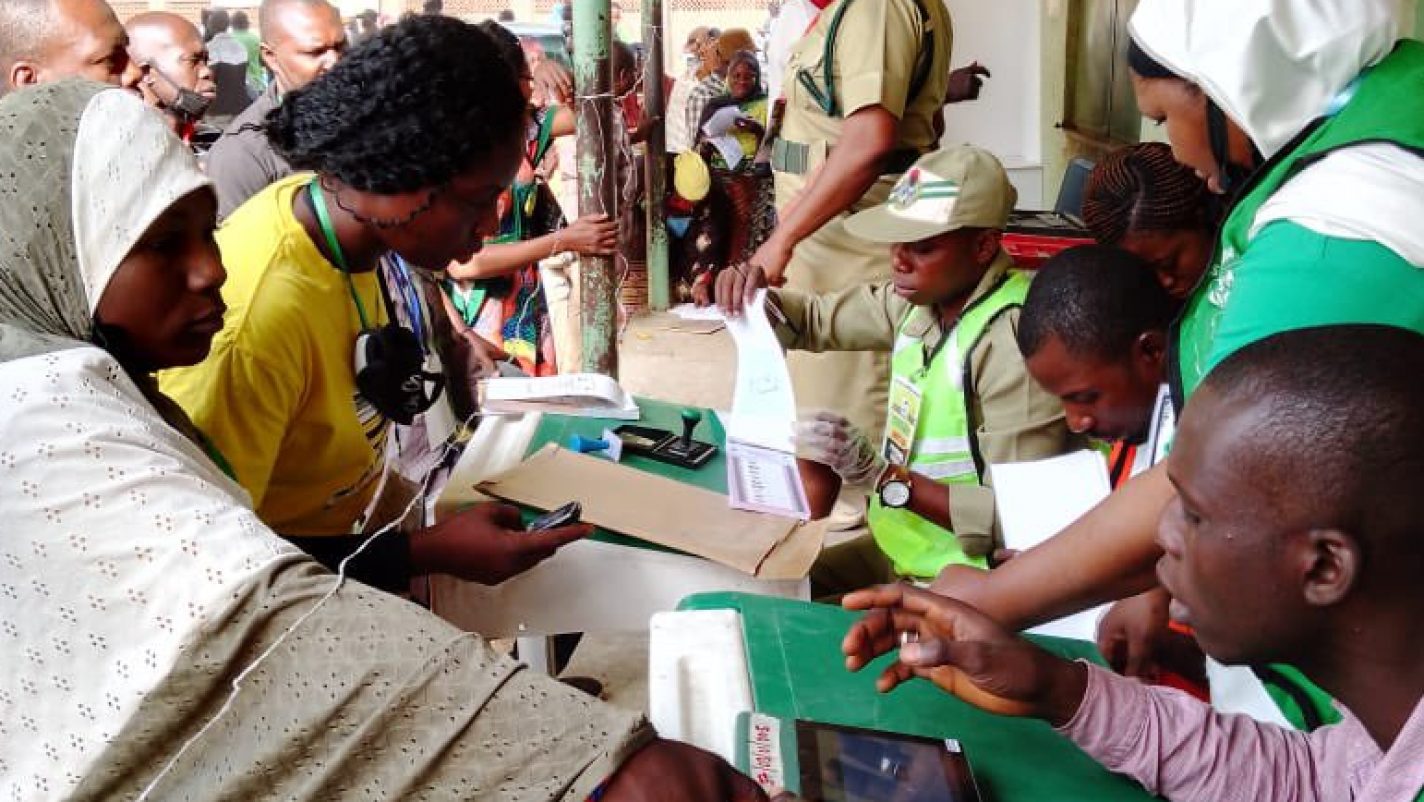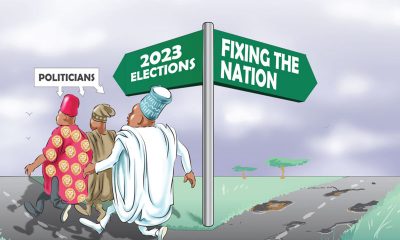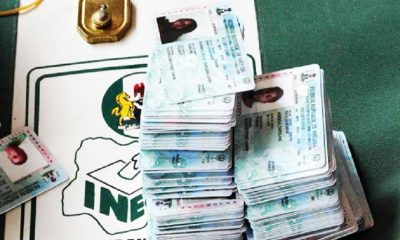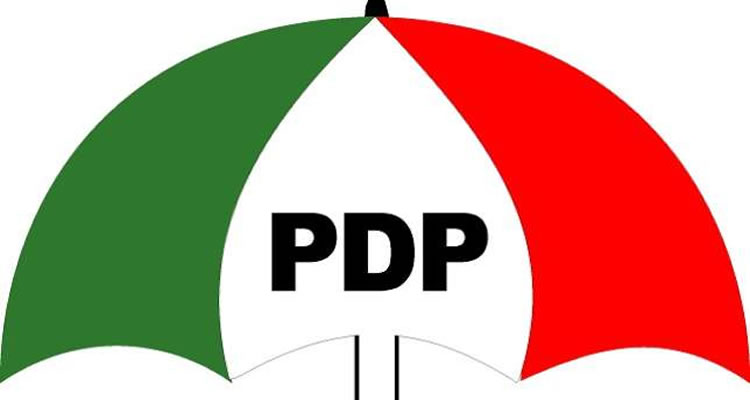Feature/OPED
2023 and Voting in Anger Quagmire

By Jerome-Mario Chijioke Utomi
When millions of people are cheated for too long, restitution becomes not just a costly process but substantial in financial and human terms; inferior education, poor housing, unemployment, and poor healthcare facilities-Martin Luther King Jr.
It is not only a barefaced truth that Nigeria’s youngest citizens have crawled out of their shells to make a demand that their elected government treat them with dignity and protect their constitutional rights and democratic freedoms.
Rather, what is in some ways newsy and apparent is that the youths grouse against the ruling party enjoy the support of well-meaning Nigerians of diverse backgrounds, professions, religions and tribes.
It was a similar feeling that partially explains the recent admonition by Babatunde Fashola, Minister of Works and Housing, during the sixth edition of the annual ‘BRF GABFEST’, held recently in Lagos and had as its theme, ‘What Am I Voting For?’, to advise Nigerians to vote in the 2023 polls based on track record and resist voting in anger.
‘Emotions should not be the primary drive for making choices of quality leaders who will address the challenges of the country. We might wonder how to get candidates to address these issues. One way is to look at what their manifestos present and what their political parties profess. The other way is to attend rallies they organize. I urge you to vote by holding debates and town halls where you put questions to the candidates to test their abilities.
“I urge you to vote by looking at what the candidates have done before, this is like asking for the referees during an interview or talking to a previous employer. This is how to recruit an employee. Not by anger.”
Indeed, the insight given by the Minister remains credible and should be encouraged.
But beyond this peripheral consideration, there exist torrents of reasons why many young Nigerians who were not of age in 2015 will get the chance to vote for the first time, and those who voted last time out will want to activate their dreams in another call for change; this time for the better.
Aside from the fact that the new orientation would be shaped by recent fiscal, sociological, political and communal happenings in the country; coupled with the pockets of ethnoreligious upheavals and misgivings from one region against another or powerful personalities against each other, the present movement and ‘youth’s revolt’ is majorly a fight against deformed leadership, resource mismanagement and perennial egotism, and fired by the reality that the oppressed cannot remain oppressed forever. After about eight years of unfulfilled change, the electorate should be excused if they enter 2019 with a new dream on their minds, and head to the polls with a different mentality from what they had in 2015 and 2019 respectively.
There are countless examples of how government daily disconnects from the people, but perhaps, understandably the first one that comes to mind is their inability to recognize that public order, personal and national security, economic and social programmes and prosperity are not the natural order of things but depends on the ceaseless efforts and attentions from an honest and effective government that the people elect.
This piece is not alone in this line of belief.
In 2018, for instance, former President Obasanjo in his personal but open letter to President Muhammadu complained about ‘lice of poor performance in government- poverty, insecurity, poor economic management, nepotism, gross dereliction of duty, condonation of misdeed-if not outright encouragement of it, lack of progress and hope for the future, lack of national cohesion and poor management of internal political dynamics and widening inequality’’
Today, such fears expressed by the Obasanjo cannot be described as unfounded.
On the issue of petrol pump price and electricity tariff hike, I recall now with nostalgia that one of the popular demands during the fuel subsidy removal protest in January 2012, under President Goodluck Ebele Jonathan’s administration, was that the federal government should take measures to strengthen corporate governance in the Nigerian National Petroleum Corporation, NNPC, as well as in the oil and gas sector as a whole. This is because of the belief that weak structures made it possible for endemic corruption in the management of both the downstream and upstream sectors of the oil and gas industry.
Eight years after such demand was made and Jonathan has gone, the three government-owned refineries in the country have not been able to function at full capacity as promised by the present administration for a myriad of reasons that revolve around corruption.
Today, if there is anything that Nigerians wish that the FG should accomplish quickly, it is getting the refineries to function optimally as well as make the NNPC more accountable to the people. What happened under president Jonathan has become a child’s play when compared with the present happenings in Nigeria’s oil/gas and electricity sectors.
Under this condition, the question may be asked; why won’t the youth revolt that Nigeria at independence was tipped by Global economic experts, following a study of its strides, to emerge as the most successful black nation because of its purpose-driven population and with an unbridled hunger to succeed, but today, contrary to that prediction, crawl at the base of the world’s economic pyramid? Why won’t the youths protest in a country that was in the 1960s/70 laced with splendid agriculture, immense natural resources, a fantastic GDR, a strong infrastructure, world-class universities, an awe-inspiring telecommunication system, a foremost and far-reaching television station, an excellent sport, a vibrant and formidable military, but today, ranks as the world poverty capital stripped of infrastructures? Why can’t the masses revolt in a country that has so many outstanding people in all fields of scholarship, but has for yet-to-be-identified reasons allowed the high standards the British left them to be lowered?
This development becomes even more painful when one remembers that presently in the country, going by the national bureau of statistics reports, 27.1 per cent of the nation’s workforce is unemployed, 40.8 per cent of young people aged 15-24 and 30.8 per cent of 25-34 years are out of work.
If Nigeria’s unemployed youth were its own country, says a report, it would be larger than Tunisia or Belgium.
Looking at this legion of challenges, one thing stands out. This piece is of the view that there is something fundamentally wrong with a society that does not give opportunities to its young people even when it is globally noted that youths have in the past rescued societies.
However, from what the youths are saying, it appears they have suddenly realized that the Constitution gave sovereignty to the people. That every citizen is expected to hold government stakeholders to account for the use of the resources entrusted to their care. They have remembered that the outlook is bleak and have decided to use their innovative prowess to change the narrative. Particularly as ‘the failure of the government to improve economic conditions and expand opportunities for its youngest citizens has been worsened by President Muhammadu Buhari who has presided over two recessions.
Indeed, while it is relevant for all to take hope in the youths’ capacity to enthrone a nation where we can coexist harmoniously irrespective of tribe or ethnical inclination and truly establish the egalitarian society that we have been deprived of, our leaders must not fail to remember that what the youths currently demand is good governance, and someone to nurture their potential for innovation, creativity, and self-confidence in leadership. Leaders must also recognize that ‘those who lead from the top of the pyramid end up leading only those on top, which is not how development exercise should be carried out’.
To win, therefore, the youth must be guided by the time-honoured saying that courage faces fear and masters it while cowardice represses fear and is thereby mastered by it. Courageous men never lose their zest for living even though their life situation is restless, but cowardly men overwhelmed by the uncertainties of life, lose the will to live’. This is not the time to show apathy or complacency but a period to work passionately and indefatigably to right the wrong.
Utomi Jerome-Mario is the Programme Coordinator (Media and Public Policy), Social and Economic Justice Advocacy (SEJA), a Lagos-based Non-Governmental Organization (NGO) and can be reached via Je*********@***oo.com/08032725374
Feature/OPED
Brent’s Jump Collides with CBN Easing, Exposes Policy-lag Arbitrage

Nigeria is entering a timing-sensitive macro set-up as the oil complex reprices disruption risk and the US dollar firms. Brent moved violently this week, settling at $77.74 on 02 March, up 6.68% on the day, after trading as high as $82.37 before settling around $78.07 on 3 March. For Nigeria, the immediate hook is the overlap with domestic policy: the Central Bank of Nigeria (CBN) has just cut its Monetary Policy Rate (MPR) by 50 basis points to 26.50%, whilst headline inflation is still 15.10% year on year in January.
“Investors often talk about Nigeria as an oil story, but the market response is frequently a timing story,” said David Barrett, Chief Executive Officer, EBC Financial Group (UK) Ltd. “When the pass-through clock runs ahead of the policy clock, inflation risk, and United States Dollar (USD) demand can show up before any oil benefit is felt in day-to-day liquidity.”
Policy and Pricing Regime Shift: One Shock, Different Clocks
EBC Financial Group (“EBC”) frames Nigeria’s current set-up as “policy-lag arbitrage”: the same external energy shock can hit domestic costs, FX liquidity, and monetary transmission on different timelines. A risk premium that begins in crude can quickly show up in delivered costs through freight and insurance, and EBC notes that downstream pressure has been visible in refined markets, with jet fuel and diesel cash premiums hitting multi-year highs.
Market Impact: Oil Support is Conditional, Pass-through is Not
EBC points out that higher crude is not automatically supportive of the naira in the short run because “oil buffer” depends on how quickly external receipts translate into market-clearing USD liquidity. Recent price action illustrates the sensitivity: the naira was quoted at 1,344 per dollar on the official market on 19 February, compared with 1,357 a week earlier, whilst street trading was cited around 1,385.
At the same time, Nigeria’s inflation channel can move quickly even during disinflation: headline inflation eased to 15.10% in January from 15.15% in December, and food inflation slowed to 8.89% from 10.84%, but energy-led transport and logistics costs can reintroduce pressure if the risk premium persists. EBC also points to a broader Nigeria-specific reality: the economy grew 4.07% year on year in 4Q25, with the oil sector expanding 6.79% and non-oil 3.99%, whilst average daily oil production slipped to 1.58 million bpd from 1.64 million bpd in 3Q25. That mix supports external-balance potential, but it also underscores why the domestic liquidity benefit can arrive with a lag.
Nigeria’s Buffer Looks Stronger, but It Does Not Eliminate Sequencing Risk
EBC sees that near-term external resilience is improving. The CBN Governor said gross external reserves rose to USD 50.45 billion as of 16 February 2026, equivalent to 9.68 months of import cover for goods and services. Even so, EBC views the market’s focus as pragmatic: in a risk-off tape, investors tend to price the order of transmission, not the eventual balance-of-payments benefit.
In the near term, EBC expects attention to rotate to scheduled energy and policy signposts that can confirm whether the current repricing is a short, violent adjustment or a more durable regime shift, including the U.S. Energy Information Administration (EIA) Short-Term Energy Outlook (10 March 2026), OPEC’s Monthly Oil Market Report (11 March 2026), and the U.S. Federal Reserve meeting (17 to 18 March 2026). On the domestic calendar, the CBN’s published schedule points to the next Monetary Policy Committee meeting on 19 to 20 May 2026.
Risk Frame: The Market Prices the Lag, Not the Headline
EBC cautions that outcomes are asymmetric. A rapid de-escalation could compress the crude risk premium quickly, but once freight, insurance, and hedging behaviour adjust, second-round effects can linger through inflation uncertainty and a more persistent USD bid.
“Oil can act as a shock absorber for Nigeria, but only when the liquidity channel is working,” Barrett added. “If USD conditions tighten first and domestic pass-through accelerates, the market prices the lag, not the headline oil price.”
Brent remains an anchor instrument for tracking this timing risk because it links energy-led inflation expectations, USD liquidity, and emerging-market risk appetite in one market. EBC Commodities offering provides access to Brent Crude Spot (XBRUSD) via its trading platform for following energy-driven macro volatility through a single instrument.
Feature/OPED
Gen Alpha: Africa’s Digital Architects, Not Your Target Audience

By Emma Kendrick Cox
This year, the eldest Gen Alpha turns 16.
That means they aren’t just the future of our work anymore. They are officially calling for a seat at the table, and they’ve brought their own chairs. And if you’re still calling this generation born between 2010 and 2025 the iPad generation, then I hate to break it to you, but you’re already obsolete. To the uninitiated, they look like a screen-addicted mystery. To those of us paying attention, they are the most sophisticated, commercially potent, and culturally fluent architects Africa has ever seen.
Why? Because Alphas were not born alongside the internet. They were born inside it. And by 2030, Africa will be home to one in every three Gen Alphas on the planet.
QWERTY the Dinosaur
We are witnessing the rise of a generation that writes via Siri and speech-to-text before they can even hold a pencil. With 63% of these kids navigating smartphones by age five, they don’t see a QWERTY keyboard as a tool. They see it as a speed bump, the long route, an inefficient use of their bandwidth. They don’t need to learn how to use tech because they were born with the ability to command their entire environment with a voice note or a swipe.
They are platform agnostic by instinct. They don’t see boundaries between devices. They’ll migrate from an Android phone to a Smart TV to an iPhone without breaking their stride. To them, the hardware is invisible…it’s the experience that matters.
They recognise brand identities long before they know the alphabet. I share a home with a peak Gen Alpha, age six and a half (don’t I dare forget that half). When she hears the ding-ding-ding-ding-ding of South Africa’s largest bank, Capitec’s POS machine, she calls it out instantly: “Mum! Someone just paid with Capitec!” It suddenly gives a whole new meaning to the theory of brand recall, in a case like this, extending it into a mental map of the financial world drawn long before Grade 2.
And it ultimately lands on this: This generation doesn’t want to just view your brand from behind a glass screen. They want to touch it, hear it, inhabit it, and remix it. If they can’t live inside your world, you’re literally just static.
The Uno Reverse card
Unlike any generation we’ve seen to date, households from Lagos to Joburg and beyond now see Alphas hold the ultimate Uno Reverse card on purchasing power. With 80% of parents admitting their kids dictate what the family buys, these Alphas are the unofficial CTOs and Procurement Officers of the home:
-
The hardware veto: Parents pay the bill, but Alphas pick the ISP based on Roblox latency and YouTube 4K buffers.
-
The Urban/Rural bridge: In the cities, they’re barking orders at Alexa. In rural areas, they are the ones translating tech for their families and narrowing the digital divide from the inside out.
-
The death of passive: I’ll fall on my sword when I say that with this generation, the word consumer is dead. It implies they just sit there and take what you give them, when, on the contrary, it is the total opposite. Alphas are Architectural. They are not going to buy your product unless they can co-author the experience from end to end.
As this generation creeps closer and closer to our bullseye, the team here at Irvine Partners has stopped looking at Gen Alpha as a demographic and started seeing them as the new infrastructure of the African market. They are mega-precise, fast, and surgically informed.
Believe me when I say they’ve already moved into your industry and started knocking down the walls. The only question is: are you building something they actually want to live in, or are you just a FaceTime call they are about to decline?
Pay attention. Big moves are coming. The architects are here.
Emma Kendrick Cox is an Executive Creative Director at Irvine Partners
Feature/OPED
Why Digital Trust Matters: Secure, Responsible AI for African SMEs?

By Kehinde Ogundare
For years, security for SMEs across sub-Saharan Africa meant metal grilles and alarm systems. Today, the most significant risks are invisible and growing faster than most businesses realise.
Artificial Intelligence has quietly embedded itself into everyday operations. The chatbot responding to customers at midnight, the system forecasting inventory requirements, and the software identifying unusual transactions are no longer experimental technologies. They are becoming standard features of modern business tools.
Last month’s observance of Safer Internet Day on February 10, themed ‘Smart tech, safe choices’, marked a pivotal moment. As AI adoption accelerates, the conversation must shift from whether businesses should use AI to how they deploy it responsibly. For SMEs across Africa, digital trust is no longer a technical consideration. It is a strategic business imperative.
The evolving threat landscape
Cybersecurity threats facing sub-Saharan African SMEs have moved well beyond basic phishing emails. Globally, cybercrime costs are projected to reach $10.5 trillion this year, fuelled by generative AI and increasingly sophisticated social engineering techniques. Ransomware attacks now paralyse entire operations, while other threats quietly extract sensitive customer data over extended periods.
The regional impact is equally significant. More than 70% of South African SMEs report experiencing at least one attempted cyberattack, and Nigeria faces an average of 3,759 cyberattacks per week on its businesses. Kenya recorded 2.54 billion cyber threat incidents in the first quarter of 2025 alone, whilst Africa loses approximately 10% of its GDP to cyberattacks annually.
The hidden risk of fragmentation
A common but often overlooked vulnerability lies in digital fragmentation.
In the early stages of growth, SMEs understandably prioritise affordability and agility. Over time, this can result in a patchwork of disconnected applications, each with separate logins, security standards, and privacy policies. What begins as flexibility can involve operational complexity.
According to IBM Security’s Cost of a Data Breach Report, companies with highly fragmented security environments experienced average breach costs of $4.88 million in 2024.
Fragmented systems create blind spots; each additional data transfer between applications increases exposure. Inconsistent security protocols make governance harder to enforce. Limited visibility reduces the ability to detect anomalies early. In practical terms, complexity increases risk.
Privacy-first AI as a competitive differentiator
As AI capabilities become embedded in business software, SMEs face a choice about how they approach these powerful tools. The risks are not merely theoretical.
Consumers across Africa are becoming more aware of data rights and are willing to walk away from businesses that cannot demonstrate trustworthiness. According to KPMG’s Trust in AI report, approximately 70% of adults do not trust companies to use AI responsibly, and 81% expect misuse. Meanwhile, studies also show that 71% of consumers would stop doing business with a company that mishandles information.
Trust, once lost, is difficult to rebuild. In the digital age, a single data leak can destroy a reputation that took ten years to build. When customers share their payment details or purchase history, they extend trust. How you handle that trust, particularly when AI processes their data, determines whether they return or take their business elsewhere.
Privacy-first, responsible AI design means building intelligence into business systems with data protection, transparency and ethical use embedded from the outset. It involves collecting only necessary information, storing it securely, being transparent about how AI makes decisions, and ensuring algorithms work without compromising customer privacy. For SMEs, this might mean choosing inventory software where predictive AI runs on your own data without sending it externally, or customer service platforms that analyse patterns without exposing individual records. When AI is built responsibly into unified platforms, it becomes a competitive advantage: you gain operational efficiency whilst demonstrating that customer data is protected, not exploited.
Unified platforms and operational resilience
The solution lies in rethinking digital infrastructure. Rather than accumulating disparate tools, businesses need unified platforms that integrate core functions whilst maintaining consistent security protocols.
A unified approach means choosing cloud-based platforms where functions share common security standards, and data flows seamlessly. For a manufacturing SME, this means inventory management, order processing and financial reporting operate within a single security framework.
When everything operates cohesively, security gaps diminish, and the attack surface shrinks. And the benefits extend beyond risk reduction: employees spend less time on administrative friction, customer data stays consistent, and platforms enable secure collaboration without traditional infrastructure costs.
Safer Internet Day reminds us that the digital world requires active stewardship. For SMEs across the African continent who are navigating complex threats whilst harnessing AI’s potential, digital trust is foundational to sustainable growth. Security, privacy and responsible AI are essential characteristics of any technology infrastructure worth building upon. Businesses that embrace unified, privacy-first platforms will be more resilient against cyber threats and better positioned to earn and maintain trust. In a market where trust is currency, that advantage is everything.
Kehinde Ogundare is the Country Head for Zoho Nigeria
-

 Feature/OPED6 years ago
Feature/OPED6 years agoDavos was Different this year
-
Travel/Tourism10 years ago
Lagos Seals Western Lodge Hotel In Ikorodu
-

 Showbiz3 years ago
Showbiz3 years agoEstranged Lover Releases Videos of Empress Njamah Bathing
-

 Banking8 years ago
Banking8 years agoSort Codes of GTBank Branches in Nigeria
-

 Economy3 years ago
Economy3 years agoSubsidy Removal: CNG at N130 Per Litre Cheaper Than Petrol—IPMAN
-

 Banking3 years ago
Banking3 years agoSort Codes of UBA Branches in Nigeria
-

 Banking3 years ago
Banking3 years agoFirst Bank Announces Planned Downtime
-

 Sports3 years ago
Sports3 years agoHighest Paid Nigerian Footballer – How Much Do Nigerian Footballers Earn






















